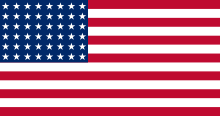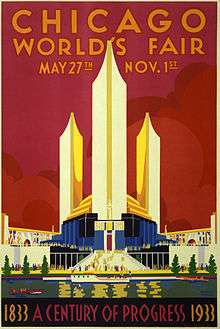1933 in the United States
| 1933 in the United States | |
|---|---|
| Years: | 1930 1931 1932 – 1933 – 1934 1935 1936 |
|
| |
 48 stars (1912–59) | |
|
Timeline of United States history
| |
Events from the year 1933 in the United States.
Incumbents

Presidents Hoover and Roosevelt at FDR's Inauguration, March 4, 1933
Federal Government
- President: Herbert Hoover (R-California) (until March 4), Franklin D. Roosevelt (D-New York) (starting March 4)
- Vice President: Charles Curtis (R-Kansas) (until March 4), John Nance Garner (D-Texas) (starting March 4)
- Chief Justice: Charles Evans Hughes (New York)
- Speaker of the House of Representatives: John Nance Garner (D-Texas) (until March 4), Henry Thomas Rainey (D-Illinois) (starting March 9)
- Senate Majority Leader: James Eli Watson (R-Indiana) (until March 4), Joseph Taylor Robinson (D-Arkansas) (starting March 4)
- Congress: 72nd (until March 4), 73rd (starting March 4)
Events
January–March

March 4: Franklin D. Roosevelt begins the first of four terms as President
- January 5
- Construction of the Golden Gate Bridge begins in San Francisco Bay.
- Calvin Coolidge, 30th President of the U.S (1923–1929) dies.
- January 17 – The U.S. Congress votes favorably for Philippines independence, against the view of President Herbert Hoover.
- January 23 – The Twentieth Amendment to the United States Constitution is ratified, changing Inauguration Day from March 4 to January 20.
- January 30 – The Lone Ranger debuts on American radio.
- February 6 – The Twentieth Amendment to the United States Constitution goes into effect.
- February 6–February 7 – Officers on the USS Ramapo record a 34-meter high sea-wave in the Pacific Ocean.
- February 10 – The New York City-based Postal Telegraph Company introduces the first singing telegram.
- February 15 – In Miami, Florida, Giuseppe Zangara attempts to assassinate President-elect Franklin D. Roosevelt, but instead fatally wounds Chicago Mayor Anton J. Cermak.
- February 17 – The Blaine Act ends Prohibition in the United States.
- March 2 – The original film version of King Kong, starring Fay Wray, premieres at Radio City Music Hall and the RKO Roxy Theatre in New York City.
- March 3 – Mount Rushmore National Memorial is dedicated.
- March 4
- U.S. President Herbert Hoover is succeeded by Franklin D. Roosevelt, who in reference to the Great Depression, proclaims "The only thing we have to fear, is fear itself" in his inauguration speech. FDR is sworn in by Chief Justice Charles Evans Hughes. It is also the last time Inauguration Day in the United States occurs on March 4.
- Frances Perkins becomes United States Secretary of Labor, and the first female member of the United States Cabinet.
- March 5 – Great Depression: President Franklin D. Roosevelt declares a "bank holiday", closing all United States banks and freezing all financial transactions (the 'holiday' ends on March 13).
- March 6 – Mayor Anton Cermak of Chicago dies of the wound he received on February 15.
- March 9 – Great Depression: The U.S. Congress begins its first 100 days of enacting New Deal legislation.
- March 10 – An earthquake in Long Beach, California kills 117 people.
- March 12 – Great Depression: Franklin D. Roosevelt addresses the nation for the first time as President of the United States, in the first of his "Fireside Chats".
- March 15 – The Dow Jones Industrial Average rises from 53.84 to 62.10. The day's gain of 15.34%, achieved during the depths of the Great Depression, remains to date as the largest 1-day percentage gain for the index.
April–June

May 27: Century of Progress World's Fair opens
- April - Civilian Conservation Corps established.[1]
- April 4 – The U.S. airship Akron crashes off the coast of New Jersey, leaving 73 dead.
- April 5
- U.S. President Franklin D. Roosevelt declares a national emergency and issues Executive Order 6102, making it illegal for U.S. citizens to own gold.
- Emergency Conservation Work founded.
- April 7 – Sale of some beer is legalized in the U.S. under the Cullen-Harrison Act of March 22, 8 months before the full repeal of Prohibition in December.
- April 19 – The United States officially goes off the gold standard.
- April 26 – Editors of the Harvard Lampoon steal the Sacred Cod of Massachusetts from the State House (it is returned two days later).
- May 3 – Nellie Tayloe Ross becomes the first woman to be named director of the United States Mint.
- May 5 – The detection by Karl Jansky of radio waves from the center of the Milky Way Galaxy is reported in the New York Times. The discovery leads to the birth of radio astronomy.
- May 12 – Agricultural Adjustment Act is enacted in the USA.
- May 18 – New Deal: President Franklin D. Roosevelt signs an act creating the Tennessee Valley Authority.
- May 27
- New Deal: The Federal Securities Act is signed into law, requiring the registration of securities with the Federal Trade Commission.
- The Century of Progress World's Fair opens in Chicago.
- Walt Disney's classic Silly Symphony cartoon The Three Little Pigs is first released.
- June 5 – The U.S. Congress abrogates the United States' use of the gold standard by enacting a joint resolution (48 Stat. 112) nullifying the right of creditors to demand payment in gold.
- June 6 – The first drive-in theater opens in Camden, New Jersey.
- June 15 – National Guard Bureau founded.
- June 17 – Union Station Massacre: In Kansas City, Missouri, Pretty Boy Floyd kills four unarmed FBI agents and accidentally kills fugitive Frank Nash in an attempt to free Nash.
- June 26 – The American Totalisator Company unveils its first electronic pari-mutuel betting machine at the Arlington Park Racetrack near Chicago.
July–September
- July 6 – The first Major League Baseball All-Star Game is played at Comiskey Park in Chicago.
- July 22 – "Machine-Gun" Kelly and Albert Bates kidnap Charles Urschel, an Oklahoma oilman, and demand $200,000 ransom.
- July 24 – Several members of the Barrow Gang are injured or captured during a running battle with local police near Dexter, Iowa.
- August 10
- Division of Investigation founded.
- Shipping Board Bureau and Merchant Fleet Corporation founded.
- August 14 – Loggers cause a forest fire in the Coast Range of Oregon, later known as the first forest fire of the Tillamook Burn. It is extinguished on September 5, after destroying 240,000 acres (971 km²).
October–December

December 5, 1933: Sloppy Joe's Bar opens in Key West, Florida (1986 photo)
- October 10 – A United Airlines Boeing 247 is destroyed near Chesterton, Indiana by a bomb. This is the first proven case of air sabotage in commercial airline history.
- October 12 – The United States Army Disciplinary Barracks on Alcatraz is acquired by the United States Department of Justice, which plans to incorporate the island into its Federal Bureau of Prisons as a federal penitentiary.
- October 17 – Albert Einstein arrives in the United States as a refugee from Nazi Germany.
- November 8 – New Deal: – U.S. President Franklin D. Roosevelt unveils the Civil Works Administration, an organization designed to create jobs for more than 4 million of the unemployed.
- November 11 – Dust Bowl: In South Dakota, a very strong dust storm strips topsoil from desiccated farmlands (one of a series of disastrous dust storms that year).
- November 16 – The United States and the Soviet Union establish formal diplomatic relations.
- December 5 – The 21st Amendment to the United States Constitution, repealing Prohibition, goes into effect.
Undated

1933: 12 new Chevrolet pickup trucks for the Civilian Conservation Corps, Yellowstone National Park.
- Business Plot: Gerald MacGuire allegedly organizes a coup to overthrow President Franklin D. Roosevelt. It becomes public in 1934.
- US President Roosevelt rejects socialism and government ownership of industry.
- The first doughnut store under the Krispy Kreme name opens on Charlotte Pike in Nashville, Tennessee.[2]
- 15 million unemployed in the USA.
Ongoing
- Lochner era (c. 1897–c. 1937)
- U.S. occupation of Haiti (1915–1934)
- Prohibition (1919–1933)
- Great Depression (1929–1933)
- Dust Bowl (1930–1936)
- New Deal (1933–1938)
Births
- January 2 – Dan Duncan, businessman, oil company executive and billionaire (died 2010)
- January 5 – Leonard Marsh, businessman, co-founded Snapple (died 2013)
- January 16 – Susan Sontag, novelist (died 2004)
- January 23 – Chita Rivera, actress and dancer
- January 29 – Paul Sally, mathematician and academic died 2013)
- February 1 – Wendell Anderson, U.S. Senator from Minnesota from 1976 to 1978
- February 2 – M'el Dowd, actress and singer (died 2012)
- February 3 – Paul Sarbanes, U.S. Senator from Maryland from 1977 to 2007
- February 13 – Kim Novak, film actress
- February 21 – Nina Simone, singer (died 2003)
- February 23 – Donna J. Stone, poet and philanthropist (died 1994)
- February 27 – Raymond Berry, football player
- March 3 – Lee Radziwill, socialite
- March 6 – Ted Abernathy, baseball player (died 2004)
- March 13 – Mike Stoller, songwriter
- March 14 – Quincy Jones, music producer and composer
- March 15 – Ruth Bader Ginsburg, Associate Justice of the Supreme Court of the United States from 1993
- March 16 – Sandy Weill, financier and philanthropist
- March 19 – Philip Roth, novelist
- March 28 – Frank Murkowski, U.S. Senator from Alaska from 1981 to 2002
- April 13 – Ben Nighthorse Campbell, U.S. Senator from Colorado from 1993 to 2005
- April 15
- Roy Clark, country musician
- Elizabeth Montgomery, television actress (died 1995)
- April 19 – Jayne Mansfield, film actress (died 1967)
- April 25
- Jerry Leiber, popular music composer (d. 2011)
- Joyce Ricketts, baseball player (AAGPBL) (died 1992)
- April 26 – Carol Burnett, actress, singer and comedian
- April 30 – Willie Nelson, country singer-songwriter
- May 3
- James Brown, African American soul musician (died 2006)
- Steven Weinberg, physicist, Nobel Prize laureate
- June 2 – Jerry Lumpe, baseball player and coach (d. 2014)
- June 7 – Herb Score, American baseball player and sportscaster (d. 2008)
- June 8
- Rommie Loudd, American football player and coach (died 1998)
- Joan Rivers, comedian (died 2014)
- June 11 – Gene Wilder, comic film actor (died 2016)
- June 22 – Dianne Feinstein, U.S. Senator from California from 1992
- August 16 – Julie Newmar, actress, dancer and singer
- August 20 – George J. Mitchell, U.S. Senator from Maine from 1980 to 1995
- August 23 – Pete Wilson, U.S. Senator from California from 1991 to 1999
- September 17 – Chuck Grassley, U.S. Senator from Iowa from 1981
- September 18 – Bob Bennett (politician), U.S. Senator from Utah from 1993 to 2011
- October 5 – Billy Lee Riley, rockabilly musician (died 2009)
- November 3
- Ken Berry, actor
- Aneta Corsaut, actress (died 1995)
- Michael Dukakis, American politician and 1988 Democratic Presidential candidate
- November 10 – Ronald Evans, astronaut (died 1990)
- November 15 – Jack Burns, actor
- November 19 – Larry King, television and radio host
- December 2 – Mike Larrabee, athlete (died 2003)
- December 30 – Jean Carnahan, U.S. Senator from Missouri from 2001 to 2002
Deaths
- January 5 – Calvin Coolidge, 30th President of the United States from 1923 till 1929, 29th Vice President of the United States from 1921 till 1923. (born 1872)
- March 6 – Anton Cermak, Former Mayor of Chicago (born 1873)
- March 30 – Giuseppe Zangara, attempted assassin of president-elect Franklin D. Roosevelt, killer of Mayor Anton Cermak of Chicago (born 1900)
- April 13 – Adelbert Ames, Governor of Mississippi from 1868 till 1870 and from 1874 till 1876 and United States Senator from Mississippi from 1870 till 1874. (born 1835)
- April 20 – William Henry Holmes, anthropologist, archaeologist, geologist and museum director (born 1846)
See also
References
External links
-
 Media related to 1933 in the United States at Wikimedia Commons
Media related to 1933 in the United States at Wikimedia Commons
This article is issued from Wikipedia - version of the 11/17/2016. The text is available under the Creative Commons Attribution/Share Alike but additional terms may apply for the media files.